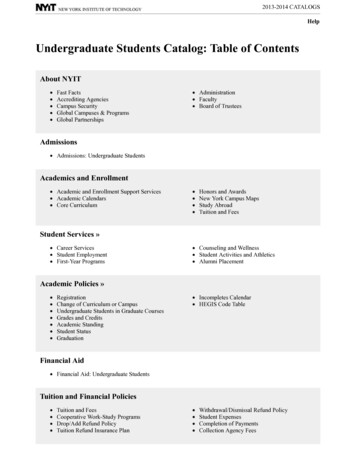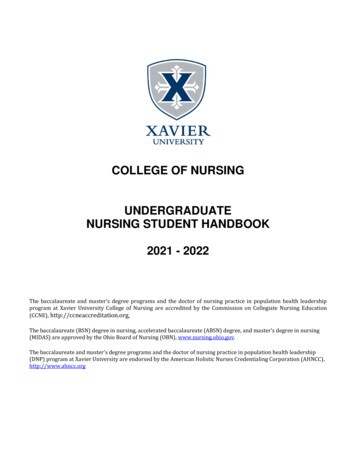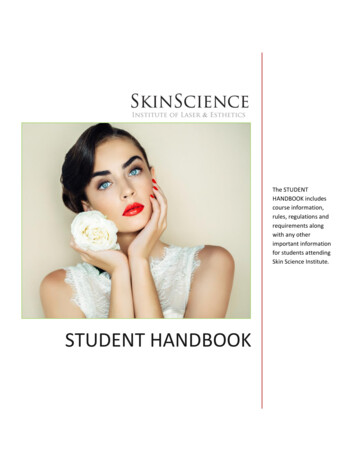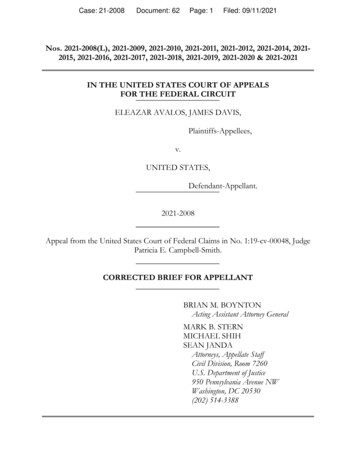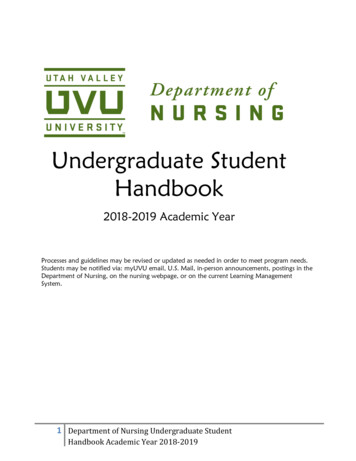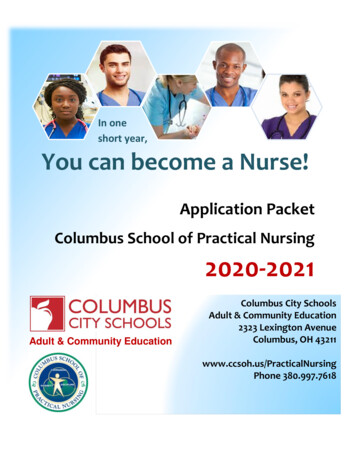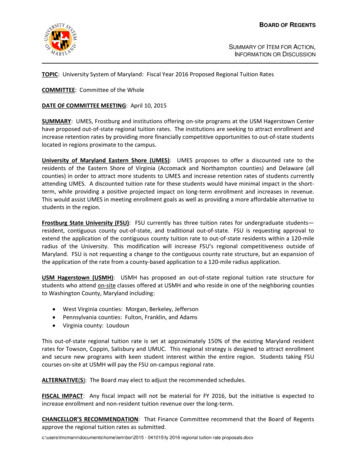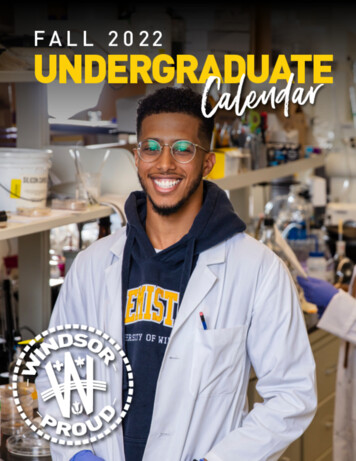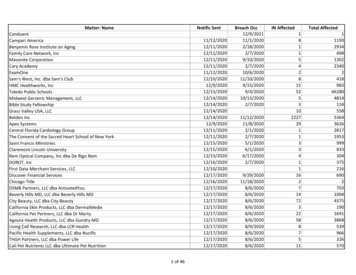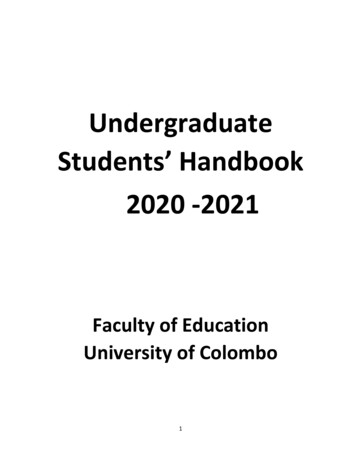
Transcription
UndergraduateStudents’ Handbook2020 -2021Faculty of EducationUniversity of Colombo1
DISCLAIMERThis handbook has been complied with information available upto January 2020.It is hereby notified that this handbook is only for generalinformation and is not for official purposes. Anyinformation contained herein shouldbe confirmed by reference to therelevant authority.2
University of ColomboVisionStrive to be a center of excellence ofregional and international repute, buildingsynergies between knowledge, education,research and entrepreneurshipMissionTo be a center of excellence in teaching andresearch with commitment to producinghuman talents of high standards and socialresponsibility who are innovative withindependent thinking and analytical skillscontributing to national development.3
THE UNIVERSITY OF COLOMBOThe University of Colombo, one of the oldest Universities in Sri Lankawas established with the enactment of the Universities Act No. 16 of1978. The University of Colombo is historically linked to the first andsingle National University of the country, the University of Ceylon,established in 1942. It is a sprawling complex located in the heart of ddhiSarvathraBhrajate”, Sanskrit for “Wisdom Enlightens” theUniversity of Colombo strives to maintain academic excellence in allareas of study. The University of Colombo, which is one of the best SouthAsian Universities has 9 Faculties with 43 Academic Departments, aCampus, a School, Institutes and several Centers and Units. Manyundergraduate andpostgraduate study courses in the fields of Arts,Science, Medicine, Management, Finance, Law, Education, IT, AestheticStudies, Molecular Biology etc. are conducted by the University. TheUniversity also offers several other services, such as library services,career guidance and services for differently-abled students. Today, theUniversity of Colombo with a proud history of over 115 years continuesin its endeavor to meet the challenge of maintaining its position as the“Capital University, Modern and International in Outlook and Character”.The location of the University affords the student population all theadvantages of a “Metropolitan University”, with easy access tointernational information/resource centers, libraries, theatres, sportscomplexes etc.4
Message from the Dean“Education is an act or experience that has a formative effecton the mind, character and physical ability of an individual notjust as the acquisition of knowledge”. It is the development ofcognitive, affective and psycho-motor aspects of an individuals.Welcome to the Faculty of Education, University of Colombo.We are a vibrant teaching and learning community producing world class educators. Afterspending a short period in the early seventies as the Department of Education in theFaculty of Arts, we had the opportunity, in the year 1975, to expand our horizons to bethe first Faculty of Education in Sri Lanka. Since that time, we have been producingprofessionals based on key principles such as effective pedagogy, evidence-basedpractices, student-centered learning, cross-disciplinary teaching, collaboration, teambuilding, leadership and innovation.At present we offer degree programs such as Bachelor of Education (B Ed), PostgraduateDiploma in Education (PGDE), Master’s in Education (M Ed), Master of Philosophy (MPhil)and Doctor of Philosophy (PhD) covering a diverse range of topics in the field ofeducation. Our Bachelor of Education and Postgraduate Diploma programs areconducted in all three major languages used in the country, Sinhala, Tamil and English,while allowing the motivated individuals to specialize in areas like “Teaching English as aSecond Language”, “Drama and Theatre”.I am proud to be the fourteenth Dean of this prestigious faculty in which, each member ofthe staff believes that “Every student is capable of learning and there are ways to reachthem all”. We are committed to exploring and introducing new and different conceptsand technologies in raising the level of consciousness of the teacher and the learner inorder to activate their authentic power affirming the etymological meaning of the word,“Education”.5
Organization Structure6
Organization StructureThe University of ColomboChancellorMost Rev. Dr. Oswald GomisArchbishop Emeritus of ColomboVice-ChancellorSenior Professor Lakshman DissanayakeB.DevS. (Colombo), PG Diploma (Colombo), MA(Brussels), PhD (Adelaide), FRSA (UK)MedicineProfessor Jennifer PereraMBBS, MD (Microbiology)(Colombo), MBA(Wales),Deans of FacultiesArtsNursingProfessor Premakumara de SilvaBA, MA (Colombo), MSc & PhD (UK)ProfessorDevaka K. WeerakoonBSc(Colombo),MSc, PhD (Ilinois)EducationTechnologyProfessor M.V.VithanapathiranaBSc. (Colombo), PG Diploma (Kelaniya)BA (Econ.) (Peradeniya)MA (Kelaniya), MEd (OUSL), PhD (London)Professor J.K.D.S. JayaneththiBSc (Colombo) PhD(CUNY)ScienceProfessor K.R. MahanamaBSc.(Colombo)MA, MPhil,PhD(CUNY)Graduate StudiesProfessor Nayani MelegodaBA(Hons)(Colombo)MA (British Columbia, Canada)PhD(Leeds, UK)RegistrarMr. K.A.S. EdwardBA (Econ.) (Peradeniya)MA(Econ.) (Colombo), MBA(Keelle, UK)LawMs W.I. NanayakkaraLLB (Hons) (Sri Lanka), MPhil (Colombo)LLB Attorney- at LawBursarManagement & FinanceLibrarianMs. K.S.T.Swarnalatha JayasooriyaA.C.ADr. M. P. P. DharmadasaDr. K.G.P.G. Inf.Sc. (Colombo)MLib.(Wales), PhD (Colombo)MIS (Canberra),ASLLA, FSLLAPhD (Bond, Australia), MBA (Col), BSc (Sp) Bus.Adm. (SJP), CTHE (Col)7
FACULTY OF EDUCATIONIntroductionThe Faculty of Education wasestablished in 1973. In 1975, theDepartments of Education of werebrought to Colombo and mergedwith the Faculty of Education. TheFaculty conducts undergraduateand postgraduate programs inEducation. Its mission is to facilitate the development of committed professionaleducators with relevant knowledge, favorable attitudes and useful skills for teaching,research and service to the nation.The Faculty of Education, University of Colombo performs a distinctive function in thetraining of graduates as professionals in education and in the initiation ofundergraduates to the field of education. Its contribution specifically in the field ofteacher education and in the field of higher education is of much significance tonational educational advancement. Although the Faculty of Education is the smallestFaculty in the University of Colombo in terms of undergraduate enrolment, it is thelargest Faculty in terms of Full-time Postgraduate studies. In addition to the fourdepartments, the Faculty has an Education Research and Evaluation Center (NEREC) aswell. The NEREC was established with the assistance of the World Bank in the year2000. This is the first national level education research center established with the viewto providing information for educational policy makers.8
Services providedContribution to National Development through Academic Programs Professional development of resource persons for all levels of the GeneralEducation system. (Teachers, In-service Advisors, Master teachers, SchoolPrincipals, Director of Education, NIE Officers, ) Annually around 1500 aretrained in both full time and part time courses Specialized graduate teacher professional development – Teaching English as aSecond Language (TESL), Drama & Theatre Postgraduate professional certification of graduates as CounsellorsContribution to National Development through Research Conducting national level student assessment studies and other commissionerresearch by NEREC Postgraduate (MEd, MPhil and PhD) and Staff research focus on the qualityimprovement of teaching and learning in educational settings of both GeneralEducation and Higher Education HETC QIG W3 research is focused on a theme social cohesion (7 PhD studies areongoing) Conducting research methodology courses for officers attached to Ministry ofEducation and other Professionals in the Field of EducationCommunity engagement, consultancy and outreach Institutional linkages are established with Ministry of Education for teachingpractice placements as a part-fulfillment of the Bachelor of Education Degree Annual training of 100 – 150 senior teachers as Master Teachers of the system The University Early Childhood Centre from its inception is managed by theFaculty All BEd graduate are absorbed by the Ministry of Education and Provinces asteachers as a result of the link established Extend services to other Universities, Government Departments on areas ofexpertise eg. Curriculum design, Counselling, Training of Counsellors, Teaching in9
Postgraduate Programs, Thesis examination, Policy formulation, Serving inManagement Boards and Councils Providing staff training programs for schools on requestCourses provided Undergraduate - professional degree, Bachelor of Education (Full-time – Sinhala,Tamil and English) in collaboration with the Faculty of Arts Postgraduate Diploma in Education (Full time – Sinhala and Tamil and Part-time– Sinhala and English) Postgraduate Diploma in Education – Teaching English as a Second Language Postgraduate Diploma in Education – Teaching of Drama and Theatre (Full-timeand Part-time Sinhala) Postgraduate Diploma in Counselling – (Part-time – Sinhala) Master of Education General - ( Full-time and Part-time – Sinhala & English) Master of Education in Educational Management - ( Full-time and Part-time –Sinhala & English) Master of Philosophy/Doctor of Philosophy - (Full-time and Part-time)10
Faculty of EducationDeanDr LMK BandaraBEd (Colombo), Med PG Dip Community Development, PhD (Colombo)Telephone: 011-2588812Fax: 011-2596888Senior Assistant RegistrarMs J ThayananthanBA (Jaffna Sri Lanka)Telephone: 011-2596888Fax: 011-2596888Heads of DepartmentsDepartment of Social Science Education - Dr LNP WedikandageTelephone: 011-2596887Department of Educational Psychology -Ms RDC NiroshinieTelephone: 011-2504734Department of Humanities Education- Mr SS DahanayakaTelephone: 011-2586516Department of Science & TechnologyEducation- Mr PKJE NonisTelephone: 011-2503147Education Research and Evaluation Center (NEREC)Director- Senior Professor Marie PereraTelephone /Fax: 011-258580411
Academic Staff of the FacultyDepartment of Educational PsychologyProfessor W ChandradasaMr IGC ChandrakumaraBEd, MPhil, PhD (Colombo)BEd, MPhil (Colombo)Professor Manjula V VithanapathiranaMs Enoka RandeniyaBSc (Colombo), PGDE (OUSL), PG DiplomaMA(Kelaniya), MEd (OUSL), PhD(London)BEd,PG Dip Counseling, MEdMPhil (Colombo)Dr Samudra SenarathMs PKSS ThilakarathneBA (Peradeniya), MA(West of England),PhD (Leipzig)BA, PGDE (Sri Lanka) MA(Psy)(India)Ms RABIU PereraMs Y SakthivelBEd, MEd (OUSL)BSc, PG Dip Ed (Colombo), MSc (Annamalai)Ms RDC NiroshinieMr NMM SafeekBEd, PG Dip Counseling, MEd, MPhil (Colombo)BEd, Med (OUSL)Department of Humanities EducationSenior Professor Marie PereraDr E S NeranjaniBA (Peradeniya), PG Dip (TESL), MPhil, MSc, (Colombo),PhD (Wollongong)BA (J’Pura),PG Dip (TESL), MEd (Colombo),PhD (Colombo)Ms SN RajendramMs A C I KinkiniBA, PGDE(TESL), MEd (TESOL) (Colombo)BEd, MEd (Colombo)Dr LMK BandaraMr A PaunanthieBEd(Colombo),PG Dip Community Development, MEd(Colombo),PhD (Colombo)BA(Hons)(Jaffna), PGDE(OUSL),12
Mr SS DahanayakaMr HMRC HathlahawattaBA, PG Dip Ed, MEd, MA (Colombo)BA (Hons) (Kelaniya),MEd, MPhil(Colombo)PG Dip Ed,(Colombo), MA, MPhil(Kelaniya)Ms ACI KinkiniBEd, Med (Edu.Deve.Psychology),MA in IR Pease StudiesDepartment of Science & Technology EducationMr PKJE NonisMs MGDA SiriwardenaBSc (J’Pura), PG Dip Computer Tech,PG Dip Ed, MSc (Colombo)BSc (J’Pura), PGDE (Colombo)MSc (Colombo)Ms DVKP SenevirathnaMs NVDP PriyadarshaniBSc (Peradeniya), PGDE, MEd, MPhil(Hons) (Ruhuna), MSc (Peradeniya),(Colombo)BSc (Hons) (Ruhuna), PGDE (Colombo)Mr UG ChandrajithBSc (Hons)(Ruhuna), PGDE (Colombo), MSc (Peradeniya)Department of Social Science EducationMr S GalagamageMs HM Lalitha KumariBA (Peradeniya), PG Dip Ed, MEd,MPhill (Colombo)BA (Hons), PG Dip Ed, MEdMPhil(Colombo)Dr Lakshman WedikkarageMs Jeevani HerathBA (Kelniya), PG Dip in English(TESL) (Peradeniya),MPhil, PhD (Norway)BEd (Hons), (Colombo), MA (UK)13
Mr S AthirathanBA (Hons), PG Dip Ed, MA, MEd (Jaffna)Ms CPW MalepathiranaBSc (Hons) MSc(Japan), MPP (Tokyo), PGDE (Colombo)Dr Lanka WedikandageMs TWV IndigahawelaBEd, MEd(Colombo)MPhil. (Colombo)PhD (UK)BEd, MEd (Colombo), IIEP (Paris)Mr P SivananthanBA (Hons), PGDE (Jaffna), MEd (Eastern),MA (India)Permanent Student Counselor of the Faculty: Ms RDC NiroshinieDepartment of Educational PsychologyTemporary Student Counselor of the Faculty: Ms Enoka RandeniyaDepartment of Educational PsychologyDr ES NeranjanieDepartment of Humanities EducationBachelor of EducationSelection Procedure for the Bachelor of Education Degree Students are selected for the Bachelor of Education (BEd) degree, based on theirperformance in the Faculty of Arts (FoA) in the First Semester in Sinhala, Tamiland English Only the students who have offered FND 1110/1210 (Foundation Course Unit) inthe First academic year are eligible to apply for the BEd degree. Offering two subjects that are taught in schools is essential for all the studentswho desire to be enrolled in the BEd degree. Subjects currently taught in schoolsare: Economics, Geography, Political Science, Sinhala, Buddhist studies, English,Tamil, History, ICT, Journalism14
Selected students are enrolled for the BEd degree from the second academicyear. One subject is offered by the Faculty of Education in each semester in the Secondand Third academic years while the students have to follow the other subjects inthe Faculty of Arts. In the Fourth year (Final), student will follow all the subjects in the Faculty ofEducation. Selection for the English medium course is based on the Student’s Performanceat the Language Proficiency test, as well as the performance at the interview(marks) and the average marks of the first year final examination, excluding FNDE1108 marks and FNDE 1209 marks)Bachelor of Education Part I:The subjects offered in the Second year are:Semester I:BEd 2101Philosophical & Sociological Foundation of EducationSemester II:BEd 2202Psychological Bases of EducationBachelor of Education Part II:Semester I:BEd 3103Comparative EducationBEd 3204Planning & Management at School Level EducationwOHdmkfõ§ Wmdê mdGud,dj yodrk ish u isiqka fuu wOHhk j¾Ih ; my;i yka mdGud,d tall 11 iïmQ¾K l hq; fõ’405406 1406 2407wOHdmk ñkqu iy ;lafiarejEducational Measurement & Assessment – EMAb.ekaùfï l%u úoHdj idudkH l%u&Methodology of Teaching (General Methods) – GEMb.ekaùfï l%u úoHdj úfYaIl%u&Methodology of Teaching (Special Methods) – SPMúIhud,d kHdh yd l%shdj,shCurriculum Theory and Process – CTP15
40840941041141214122mdi,a WmfoaYkhSchool Counselling - SCf;dr; re ikaksfõokh yd ;dlaIKhInformation and Communication Technology – ICTwOHdmkfha úfYaI lafIA;%Special Areas in Education – SAEmqia;ld, yd f;dr; re l ukdlrKhLibrary & Information Management – LIMm¾fhaIK l%u yd iqz ksnkaOkhResearch Methods & Minor Dissertation – RSMm%dfhda.slh ITeaching Practice I – (TP I)m%dfhda.slh IITeaching Practice II – (TP II)b.ekaùfï l%u úoHdj – úfYaI l%u& - SPMfuh fldgia follska hqla; fõ’ ta i yd my; oelafjk úIh ,ehsi;a fjkaljr fydA úIhhka folla Tng f;dard.; yelsh’ Tn úYajúoHd,hlska W.;afyda yd wkd.;fha § jD;a;Sh Ôú;fha § Tng jeo.;a hhs isf;k úIhhkafolla f;dard.; yelsh’b.ekaùfï l%u úoHd úfYaI 08406214406215406219isxy, NdIdj yd idys;H (Sinhala Language & Literature)fou NdIdj - (Tamil Language)bx.%Sis NdIdj - (English Language)mqrjeis wOHdmkh -(Civic Education)b;sydih – (History)N f.da,h – (Geography)wd¾Ól úoHdj – (Economics)foaYmd,k úoHdj – (Political Science Education)nqoaOd.u (Buddhism)m%d:ñl b.ekaùfï l%u (Primary Teaching Methods)f;dr; re ;dlaIKh (Information Technology)16
410 wOHdmkfhA úfYaI lafIa;% - SAEfuh fldgia follska hqla; fõ’ ta i yd úfYaI úIh fÌa;% w; ßkA follaf;dardf.k yeoEßh yelsh’410014100441006410074100841012mQ¾j udúh wOHdmkh - (Early Childhood Education)wOHdmksl ie,iqïlrKh - (Educational Planning)wOHdmksl ;dlaIKh - (Educational Technology)wOHdmk iudcúoHdj - (Sociology of Education)fn!oaO wOHdmkh - (Buddhist Education)m%d:ñl wOHdmkh - (Primary Education)lsishï úfYaI b.ekaùï l%uhla SPM) fyda úfYaIs; úIhh lafIa;%hla SAE)bf.kSu i yd bÈßm;ajk YsIH ixLHdj 05 lg wvqfõ kï fyda tu úIhb.ekaùu i yd fï jir ; mSGh i; iïm;a fkdue;skï tu úfYaIb.ekaùï l%uh bÈßm;a fkdlsÍug bv we;’4121 b.ekaùfï m%dfhda.sl mqyqKqj 1 (TP 1)fuys my; lafjk fldgia wka;¾.;h’1’jD;a;Sh l i,;d ixj¾Okh i yd jq jevuqZzZ 8la (meh 3x8)2’m%dfhda.sl mqyKq qj II i yd mdi,aj,g hdug fmr ta i yd iqodkï lrjkq,nk ÈYdk;s jevigyka (i;shla)3’;ud úiska f;dard.kq ,nk rcfha mdi,lg i;s foll ld,hla wkqhqla;jmdi, ms sn w;a lSï ,nd .ekSu’ (ta ld,h ; tu mdi,g hdug wjir,ndfok w;r tu i;s foll ld,h ; l hq; ld¾hhka ms sn úia;r miqjimhkq ,efí’)fuu ish,aa, i yd ilS%hj iyNd.Sùu u; ,l Kq m%odkh flf¾’17
4122 b.ekaùï m%dfhda.sl mqyqKqj 2 - (TP 2)fuu fldgi iïmQ¾K lsÍu i yd wOHdmk mSGh uÕska wkqhqla; lrkq ,nkmdi,l i;s 10 ld,hla ; , m%dfhda.sl . re mqyqKq lghq;j , fh§u wjYHh’ fuumdGud,dfõ jD;a;Sh uÜgu by kexùu i yd jk fuu fldgfia id¾:l;ajhidud¾:fha jákdlu flfrys o n,mdhs’ fuu i;s 10 id¾:lj ksudlsÍu i ydmQ¾j iQodkï we;slr .; hq; h’m uq fifuia;rh ; my; i yka úIhhka b.ekafõ’mdGud,d talli;s .KkwNsuqL meh405 (EMA)1045 h4061 (GEM)1045 h4062 (SPM) (1) úIhh1045(22.5 22.5) h407 (CTP)1045 h409 (ICT)1045 h408 (SC)1045 h(2) úIhhby; úIhhkag wu;rjiqzZ ksnkaOkh yd m¾fhaIK l%u j,g wod, Wmfoia yd foaYk fuu fifuia;rh; § meje;afõ’fojk fifuia;rh b.ekafjk úIhhka yd m%dfhda.sl mqyqKqjmdGud,d talli;s.KkwNsuqL meh411 LIM845h410 SAE845 hm%dfhda.slh1 - 4121 (TP1)1’ ÈYdk;s jevigyka18
(wOHdmk mSGfha §&2. mdi, ms sn w;a lSï3’jD;a;Sh ixj¾Ok ld¾h ieism%dfhda.slh 2 - 4122 (TP2)fld U wjg f;dard .;a mdi,l mqyqKqjiqzZ ksnkaOkh 413 (RSM)1211030h (5x6h)24h(8x3h)-iqzZ ksnkaOkh i yd wod, ieisj,g owksjd¾fhka iyNd.s úh hq; h’ úNd.h wjika ùuila we; ; iqz ZksnkaOkh NdrÈh hq; h’m%dfhda.slh I,II yd iqz ZksnkaOkh yer wfkl ;a iEu úIh tallhlu we.hSuwjidk ,sÅ; mÍlaIKhla (70%) yd mdGud,dj ; flfrk we.hSula (30%) uÕskaisÿ fõ’foaYkj,g” idlÉPdj,g, jevuqzZj,g yd . re mqyKq qjg iyNd.Sùu w;HjYH h’ iEufoaYkhl §u” jevuqzZjl §u Tfí meñKSu iy;sl lr .ekSug w;aika m;%sldj,w;aik ;eîu Tfí j.lSula nj i,lkak’fuhg wu;rj mSGh uÕska ixúOdkh lrk úúO úIh ndysr ls%hdldrlï j,giyNd.sùfuka o tnÿ úIh ndysr l%shdldrlï ixúOdkh lsÍfuka o Tnf.a l i,;dTmakxjd.; yels nj i,lkak’ ta i yd wjYH uÕfmkaùu mSGfhka ,efnkq we;’wx. iïmQ¾K jD;a;Sh . rejrfhl f,i Yla;su;aj” wNsudkj;aj” wOHdmk moaO;shgf.!rjdkaú;j m%fõYùug Tng wjYH kqu” l i,;d yd wdl,am fuu jir ; §Wmßuhg Èhq Kqlr .; yelsh’ ta i yd iQodkï jk fuka isysm;a lruq’mSGdêm;swdpd¾h t,a’tï’fla’nKavdr uhdmdGud,d iïnkaëldrlwd¾ vS iS ksfrdaIsks ñh (isxy, udOHh)mS Ysjdkka;ka(fou udOHh)Ysrka;s rdf–kaøka fuh (bx.S%is udOHh)19
Explanation of undergraduate grades and grade points.Grade points for each course unit is determined by the following grades:MarksGradeGrade Point80% and aboveA 4.00Between 75% and 79%A4.00Between 70% and 74%A-3.70Between 65% and 69%B 3.30Between 60% and 64%B3.00Between 55% and 59%B-2.70Between 50% and 54%C 2.30Between 45% and 49%C*2.00Between 40% and 44%C-1.70Between 35% and 39%D 1.30Between 30% and 39%D1.00Between 0% and 29%E0.00Note: I)II)III)* minimum performance for a pass.Honours will be awarded on the basis of the Grade Point Average (GPA).Course units for which the relevant GP is 0.00 will not be considered incalculating the GPA although the relevant course units carry some marks.The Grade Point Average (GPA) is obtained by dividing the total number of requiredcourse units. The total number of course units considered for computing the GPA willbe as provided in the by-laws.The number of course units or the grade points of the first year shall not be counted forthis purpose.20
GPA GP/NWhere:GPA Grade Point Average GA Total number of Grade PointsN Number of required Course UnitsWhere a “fail” course unit is successfully completed at a subsequent attempt by acandidate, that course unit will be identified in the transcript by a special symbol (RC).The actual grade earned by the student for the repeat course will be shown in thetranscript. However, when computing the GPA, the grade point value assigned to thatcourse unit will be 2.00 only.Extract from by lawsAward of HonoursA candidate who has satisfied the requirements of the Bachelor of Education (Special)Degree may be awarded First Class Honours, Second Class (Upper Division) Honours,Second Class (Lower Division) Honours, or a Pass as the case may be, on the results ofall the Course Units in the three years of the Degree of Bachelor of Education (Special)course of study taken together after the First Year.i. Amendments:A candidate should have a GPA of 3.50 or above and at least a grade pointof 3.25 for Teaching Practice I (Practicum I) and Teaching Practice II(Practicum II) to obtain a First class Honours.ii. A candidate should have a GPA of 3.25 or above and at least Grade Point of 3 forTeaching Practice I (Practicum I) and Teaching Practice II (Practicum II) toobtain a Second Class (Upper Division).iii. A candidate should have a GPA of 3 or above and at least a Grade Point of 2.75for Teaching Practice I (Practicum I) and Teaching Practice II (Practicum II) toobtain a Second Class (Lower Division).iv. A candidate should have a GP of 2.00 or above for all the required course units toobtain a Pass.v. Candidates who repeat course units at subsequent examinations for reasonsother than medical, will not be considered for the award of Honours.21
14. Student shall be deemed to have sat the first scheduled examination irrespective ofthe fact whether it has been actually sat or not, except in the case the Senate issatisfied that he/she has been prevented from sitting the examination due to illness orany other reasonable cause.15. Candidate who fails to complete any of the Course Units in the first attempt shall beeligible to repeat this/these Course Unit/Units within a maximum of two othersubsequent occasions.16. No candidate shall be considered to have passed the Degree of Bachelor ofEducation (Special) unless he/she has passed or has been exempted from the relevantFirst Year Course Units and the relevant Second, Third and Fourth Year Course Units ofthe Degree of Bachelor of Education (Special) and has also reached the requiredstandard of proficiency in English as prescribed under these By-laws and/or any otherRegulations and Results made by the University.EXAMINATION PROCEDURE, OFFENCES AND PUNISHMENTSRegulations made by the senate and approved by the Council of the University ofColombo under Section 136 read with Section 29 of the Universities Act No.16 of 1978as amended by the Universities (Amendment) Act No.7 of 1985.Regulations:These Regulations may be cited as the Examination Procedure, Offences andpunishment Regulations No,1 of 1986.Examination Procedure:1. Candidates are required to be at the Examination Hall at least 15 minutes beforethe commencement of each paper, but shall not enter the Hall until they arerequested to do so by the Supervisor.2. No candidate shall be admitted to the Examination Hall for any reasonwhatsoever after the expiry of half-an-hour from the commencement of theexamination. Nor shall a candidate be allowed to leave the hall until half-an-hourhas lapsed from the commencement of the examination or during the last 15minutes of the paper.22
3. On admission to the Hall, a candidate shall occupy the seat allotted to him/herand shall not change it except on the specific instructions of the Supervisor.4. A candidate shall have his/her Student record Book and the Admission Card withhim/her in the Examination Hall on every occasion he/she presentshimself/herself for a paper. His/her candidature is liable to be cancelled idhe/she does not produce the Record Book, when requested to do so.if she failsto bring his Record book on any occasion, he/she shall sign a declaration inrespect of the paper for which he/she had not produced the Record book in thedorm provided for it and produce the Record Book to the Registrar on thefollowing day. If a candidate loses his/her Record Book in the course of theExamination he/she shall obtain duplicate Record Book/Identity Card from theRegistrar, for production at the examination Hall.5. Admission Cards signed in the presence of the Supervisor/ Invigilator shall behanded over to the Supervisor/Invigilator on each occasion when a candidate sitsa paper.6. Candidates shall bring their own pens, ink, mathematical instruments, erasers,pencils or any other approved equipment or stationery which they have beeninstructed to bring.7. Examination stationery (i.e. writing paper, graph paper, drawing paper, ledgerpaper, precise paper etc.) will be supplied as and when necessary. No sheet ofpaper or answer book supplied to a candidate may be torn, crumpled, folded orotherwise mutilated.8. No candidate shall have on his/her person or in his/her clothes, or on theAdmission Card, Time Table, Record Book or any other object he/she is permittedto bring into the Examination Hall, any notes, signs, formulae or any otherunauthorized material. Books, notes, parcels, hand bags etc. which a candidatehas brought with him/her should be kept at a place indicated by theSupervisor/Invigilator. The envelope in which the Admission Card has beenposted to him/ her should not be brought into the Examination Hall.23
9. A candidate may be required by the Supervisor to declare any item in his/herpossession or person.10.Every candidate shall enter his/her Index Number at the appropriate place on theanswer book and on every continuation paper. He/She shall also enter allnecessary particulars as indicated in the cover of the answer book. A candidatewho inserts on his/ her script an Index Number other than his/her own is liableto be considered as having attempted to cheat. The Supervisor/Invigilator hasthe authority to check the answer scripts of the candidates. A script that bears noIndex Number or an Index Number which cannot be identified is liable to berejected. No candidate shall write his/her name or any other identifying mark onthe answer scripts.11.Candidates are under the authority of the Supervisor and shall assist him/her bycarrying out his/her instructions and those of his/her Invigilators, during theexamination and immediately before and after it.12.Every candidate shall conduct himself/herself in the Examination Hall and itsprecincts so as not to cause disturbance or inconvenience to the supervisor orhis/her staff or to other candidates. In entering and leaving the hall, he/she shallconduct himself/herself as quietly as possible. A candidate is liable to beexcluded from the examination Hall for disorderly conduct.13.Absolute silence shall be maintained in the Examination Hall and its precincts. Acandidate is not permitted for any reason whatsoever to communicate or tohave any dealings with any person other than the Supervisor/Invigilator. Theattention of the Supervisor/Invigilator shall be drawn by the candidate by raisinghis/her hand from where he/she is seated.14.After the examination has commenced, no candidate shall be permitted to leavethe Examination Hall even temporarily. In case of an emergency, theSupervisor/Invigilator shall grant him/her permission to do so but the candidatewill be under his/her constant surveillance.24
15.Candidates shall stop work promptly when ordered by the Supervisor/Invigilatorto do so. If this instruction is not followed, the Supervisor/Invigilator has theauthority to make an endorsement to this effect on the answer scripts.16.All calculations and rough work shall be done only on paper supplied for theexamination, and shall be cancelled and attached to the answer scripts. Suchwork should not be done on admission cards, time tables, question papers,record book or on any other paper. Any candidate who disregards theseinstructions is liable to be considered as having written notes or outlines ofanswers with the intention of copying.17.Any answer or part of an answer which is not to be considered for the purpose ofassessment shall be neatly crossed out. If the same question has been attemptedin more than one place the answer or answers that are not to be considered shallbe neatly crossed out.18.Every candidate shall hand over the answer script personally to theSupervisor/Invigilator or remain in his /her seat until it is collected. On noaccount shall a candidate hand over his/her answer script to an attendant, aminor employee or another candidate.19.A candidate who has handed over his/her answer script shall under nocircumstances be entitled to call it back.20.No candidate shall remove his/her or any other candidate’s answer scripts fromthe Examination Hall.21.No candidate shall copy or attempt to copy from any book or paper or notes orsimilar materials or from the scripts of another candidate. Nor shall anycandidate either help another candidate or obtain help from another candidateor any other person. Nor shall any candidate conduct himself/herself sonegligently that an opportunity is given to any other candidate to read anythingwritten by him/her or to watch any practical examinations performed byhim/her. Nor shall any candidate use or obtain any other unfair means to renderimproper assistance at the examination.25
22.No candidate shall submit a practical or field book or dissertation or projectstudy or answer scrip which has been done wholly or partly by anyone other thanthe candidate himself/herself.23.No person shall impersonate a candidate at the examination nor shall anycandidate allow himself/herself to be so impersonated by another person24.If circumstances arise which in the opinion of the Supervisor render thec
Department of Social Science Education Mr S Galagamage Ms HM Lalitha Kumari BA (Peradeniya), PG Dip Ed, MEd, BA (Hons), PG Dip Ed, MEd MPhill (Colombo) MPhil(Colombo) Dr Lakshman Wedikkarage Ms Jeevani Herath
